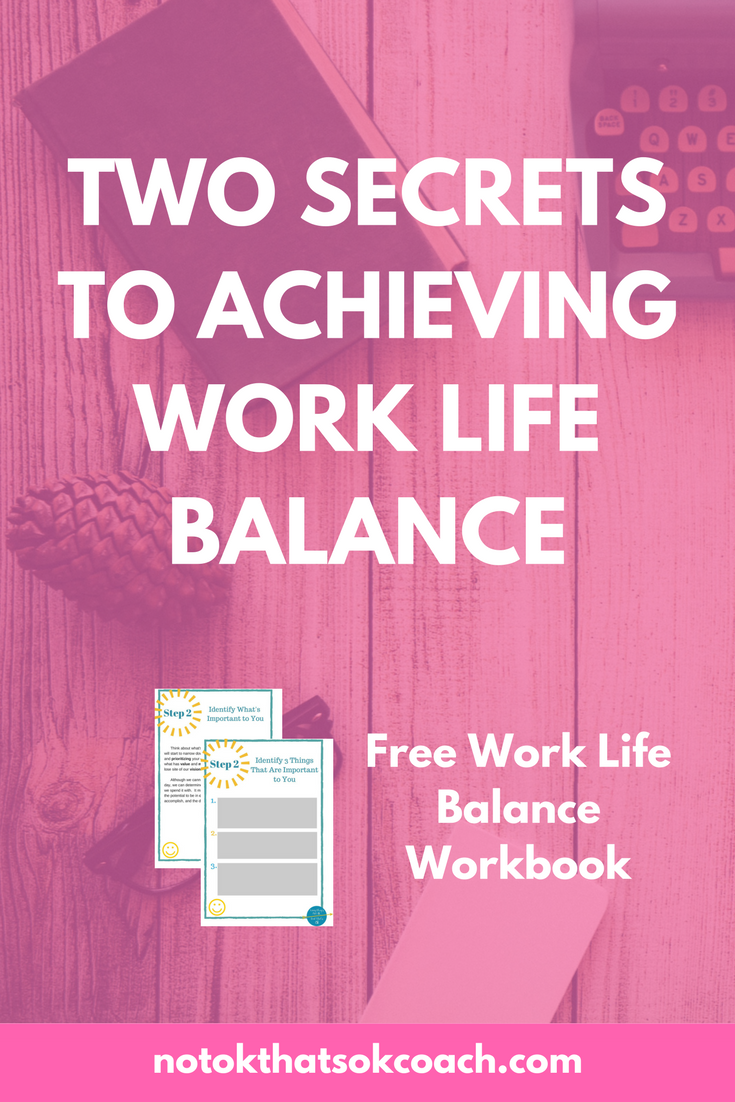The term “work life balance” is said and used all the time. It’s a pretty common phrase that just seems to be thrown around as something everyone needs and wants…but when it comes down to it, what is it?
Is balance the same for everyone or does it vary? Is there an overarching goal we should all be aiming for? Is it quantifiable or just a feeling?
According to Harvard Business Review, “satisfaction at work is influenced by factors such as benefits, pay, relationships, and commute length. But all of this boils down to two things being important, regardless of your circumstances: (1) having a life outside of work, and (2) having the money to afford it.”
What does that even mean? Well, while there may be other things involved when it’s all said and done balance is a place where we have a decent life that doesn’t involve work and some cash to enjoy it.
We all do have different scales of happiness within what we do outside of work as well as the payment we hope to make. But, according to HBR, these two things are the meat of where we find balance.
So, let’s break down both parts, together.
Life Outside the Office
It seems simple to create a life outside of work, but … not so much.
If we are constantly in the office, bringing work home, or are so stressed about the work day that we can’t seem to leave our mental baggage from the job- we will never achieve living life “outside of the office.”
Let’s break down six ways to separate yourself from the office.
Leave work at work.
Make a full commitment to yourself to not bring anything from your office to your home. That means no papers, laptop, client files… nothing. What this might mean is an extra hour or two on the job but will lead to COMPLETE separation once you close that office door.
Make meaningful plans.
A life outside of the office typically involves surrounding yourself with people you enjoy being around. Don’t just make plans to make plans, but when you do ensure it’s who you want to be with and you are there 110%. When we add things to our schedule that we don’t want to do, it’s exhaustive to our wallet and time.
Leave drama at the office.
Sometimes this might be hard to commit to, but try your best! Leave the office drama in the office. Take a longer drive or walk home, go to the gym right after the office. Whatever it takes to clear your mind from your day so you can fully enjoy your evening.
Use your PTO days.
Don’t feel guilty for using your vacation days! You earned them and they are part of your compensation package. Who cares that your coworker hasn’t used a day in 10 years? According to Alamo Rent A Car’s annual family vacation survey, millennials are almost twice as likely to shame each other for using their time as compared to other generations. Don’t be that person shaming or not using your days.
Pick a time to leave and stick to it.
Talk to your supervisor and work out a reasonable time to leave the office. If you have additional work to do that extends beyond hours, ask if you can come in later the next day. In order to have a life outside of the office, you need to actually leave the office.
Don’t eat in your office.
Yes, it’s so tempting to grab lunch or heat up that soup and go straight back to your desk. DON’T DO IT. Take a short walk, eat your lunch in the park, catch up with a friend on the phone someplace else, run an errand. Just do something that’s not in your office in the same chair you have been sitting in all day.
Having the money to afford life outside the office
I am by no means a financial consultant, but it is important to have a budget. No matter how much you are making, if you aren’t aware of your expenses you will always be searching for more money and running into the same problems. There are a few apps and online tools that not only help with budgets but are user friendly. I would highly suggest checking them out.
Mint:
You can create budgets, review bills, see alerts for unusual activity, review your credit score and more.
Digit:
This free service helps to trick you into saving money. It tracks your spending and moves some cash into a savings account.
Personal Capital:
You can track your cash flow, net-work, plan for retirement, review your investments and so much more.
Credible:
This service helps you find the best offer to refinance your student loans. By refinancing, you can save thousands of dollars and decrease your monthly payments.
When it all boils down, spending time outside of the office doing something you love with the financial stability to do it is key to finding work/life balance.
Try setting a time to leave the office, leaving your work at work, only making plans with people you want to spend time with, and taking your lunch and vacation days.
Make sure you are also taking a better look at your finances to ensure you’re spending your money wisely.
What is one thing that has kept you back from achieving work/life balance?
- Cultivating Relationships - July 20, 2021
- Empowering Our People - July 13, 2021
- Finding Purpose - July 6, 2021





Yes! This is such great information! It’s so hard to find a balance when you work from home and want to quickly take care of business during what should be family time! Thanks for sharing!
Thanks so much Laura and it really can be especially for owning your own business! Thanks for reading!
Great tips! I really struggle with leaving work at work and not checking my e-mails and messages late at night. I’m trying to get better at balancing work & personal life.
Me too! It’s so easy to fall into that since we have such easy access to email!
A better work/life balance is definitely something I’m working on this year.
Keep up posted Aryn!
These are all great points to consider! I love reading your posts. 🙂 I already use Digit but I might try out some of your other recommendations!
Thanks so much Bailey and let us know how you like the other resources!
These are some great tips on achieving what sometimes feels like the unachievable work life balance.
Thanks so much Amy!
These points are so helpful! Very well thought out. I am definitely working on these things!
I really appreciate it Kathryn! Thanks so much for sharing!
so many great reminders – i love the lunch tip. i’m so guilty of that, but it’s an easy thing to change
It’s so hard sometimes but we’re in this together. Thanks so much for reading!
You always have the best advice! I’m the worst about taking actual time off, it’s hard as business owners to leave business alone during your “personal time”
I need to work on this!
Thank you so much Brittany! I am with you and struggle sometimes with taking time for myself!
I have struggled with this since become a mom…I still want to have a professional life but also want the benefit of staying home with my kids. It’s such a fine line that can easily be crossed, but it’s so important to keep them separate! Thank you for the great tips and resources!
I’m with you! I have a 4 and 7yo and it’s so hard to balance everything as a working parent. I really try to unplug to make sure we have dedicated family time. Thanks so much for reading Mia!
This are awesome tips! I need this really. I have been struggling in balancing the time I spend with my family and my work. Thanks for sharing this helpful resources
Thanks so much for reading, Tisha! One step at a time!
These are awesome tips, I definitely need to put some of these to use!
Thanks so much Melissa!
I am totally a ‘eat lunch at my desk’ kind of girl but on those days when I can get out for lunch I feel so refreshed! You’re totally right, it’s a terrible habit I have to break! Love the tips and live by *almost* all of them!
OMG I totally was and still working on trying to get up and head out for a few minutes. I’ll admit its hard with pressing deadlines but so worth it!!
Love these tips! I’m working on a book about work-life balance and would love to feature you in the book with an interview and information about your services. Please get in touch with me. Very happy BPP hooked me up with this opportunity to talk!!
That sounds amazing Amy and a topic that’s so needed to be discussed. Shoot me an email (alissa@notokthatsok.com)
Leave work at work! My goodness this is my favorite way to create balance in life. Though, as a new blogger, I’m not sure how to keep work at work. My hope is to eventually not need to work out of the home, at least until I am done with nursing education, but don’t know how to balance work if I am working at home.
I’m with you on it being hard especially working from home. I do try to do work in my office as opposed to other places around the house. Still working on it though! How much longer until graduation??
I can totally leave work at work, which is a good thing because it stresses me out when I’m there.
i think the definition of WLB has evolved and the notion of leaving work at work actually puts a lot of unnecessary stress on people! there was a study done that people who integrate the two have greater cognitive recovery times / ability to get more done because they aren’t being overly rigid with that part of the definition.
The definition has changed and I hear more and more about work/life integration as opposed to balance. I am still a fan of leaving work at work or carving out a specific time for work as opposed to constantly being “on call” for a job that doesn’t require it.
I quit my 9-5 so that I could work from home and be my own boss. That is the best way for me to have a healthy work life balance. Constantly being on call for someone else was becoming very unhealthy for me. Now I can decide what my hours are and when.
That’s amazing Taylor! Congratulations on such a huge accomplishment!
All SO good. My problem is not being able to leave the office/leave work at home, since I work from home and am my own boss. It’s SO hard to turn off sometimes!
Coming Up Roses
I couldn’t agree with you more, Erica! I try to keep my work in my office as opposed to bringing my laptop everywhere in the house.. but it’s so hard since not doing work means not getting paid sometimes!
Not eating at your desk is a big one. Even when I get caught doing it I make sure to get out for a walk around the block.
I think work life balance goes both ways though, you a,so have to make sure not to bring your baggage to the office, and make sure that your workplace is somewhere you enjoy, not just somewhere you go because you have to
Xxox
Laura @ http://www.cookwineandthinker.com
I am with you Laura and it really does go both ways. I love how you said “not just somewhere because you have to.” I know so many people that feel that way!
Thank you so much.. encouraging and motivating…”Who cares that your coworker hasn’t used a day in 10 years?” my pick 🙂
Thanks so much!